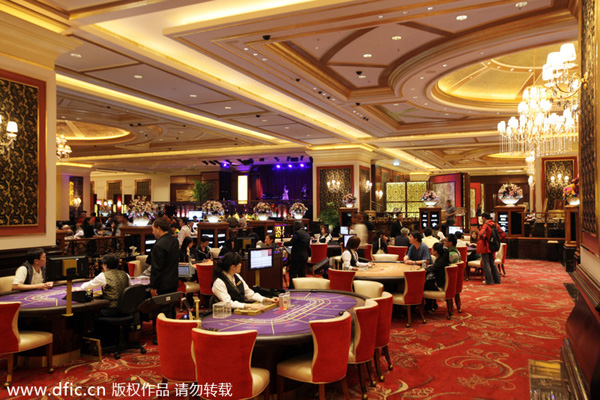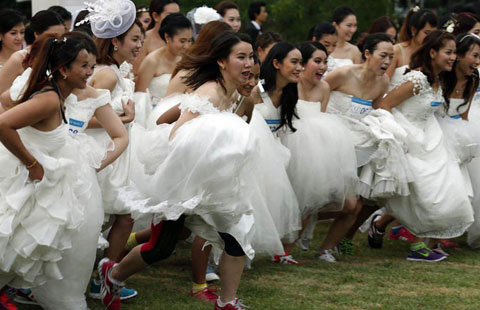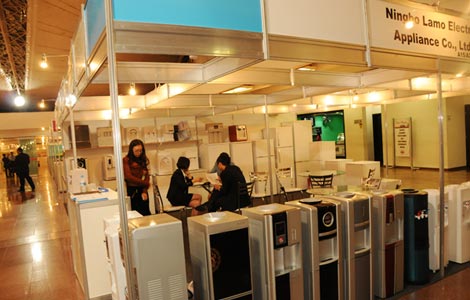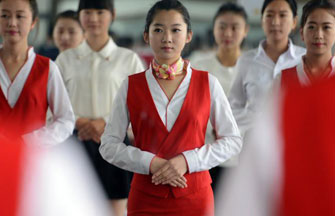Macao reports economic contraction
Updated: 2014-12-01 07:50
By Zhu Zhe in Macao(China Daily)
|
||||||||
Central government's anti-corruption campaign takes toll on gambling city
 |
|
Customers are seen gambling the casino of Plaza Macao in Macau, China, April 11, 2012. [Photo/IC] |
The economic growth of the Chinese gambling hub of Macao may slow dramatically to 2 to 3 percent this year, a senior Macao official said, after the city reported its first year-on-year economic contraction since 2009 in the third quarter as President Xi Jinping tackles corruption and excessive spending of public funds.
However, officials and analysts remained optimistic about the city's long-term growth. They noted that industries other than gambling are growing, and the low unemployment rate of 1.7 percent and abundant government reserves guarantee a stable society.
"It would be satisfactory if the economy could grow at 2 to 3 percent this year," said Chan Sau-san, director of the research and statistics department of the Monetary Authority of Macao. "In addition, the possibility of a year-on-year contraction remains."
A slowing economy on the Chinese mainland and the central government's ongoing austerity campaign have deterred high-stakes gamblers from ostentatious displays of wealth in Macao, the world's biggest gambling center and the only part of China where casinos are legal.
That would make 2014 one of the worst years in Macao's economy since its return to China in 1999. While suffering from the Asian financial crisis, the city saw its lowest yearly growth of about 2 percent in 2009, but the rate stood at 11.7 percent last year.
On Saturday, the Macao government said in a statement that the special administrative region's third-quarter GDP decreased by 2.1 percent year-on-year in real terms, the first negative quarterly growth in five years.
It attributed the leading cause of the downturn to a sluggish service trade, particularly as exports of gaming services - the spending of tourists in Macao casinos - slowed further by 12.3 percent year-on-year.
"We've seen gambling revenue drop five consecutive months since June, and it's very likely the trend will remain for the rest of the year," Tam Chon-weng, spokesman for the Macao government, said in an interview. "But we're not worried."
The total casino revenue in Macao fell 23.2 percent to 28 billion patacas ($3.5 billion) in October, dropping for the fifth straight month, according to Macao's Gaming Inspection and Coordination Bureau.
The decrease was mainly due to the shrinking VIP business, as low-tier, mass-market gambling remains robust, the bureau said.
Tight credit and a slowing economy on the Chinese mainland have left many private business people short of cash, which results in a reduction in VIP gambling.
The central government's frugality campaign has also deterred many high rollers, according to a research report provided by the economic affairs department of the Liaison Office of the Central People's Government in the Macao SAR.
Barclays PLC analyst Phoebe Tse said she expects the casino revenue to keep declining until mid-2015, when casino operators start opening new properties. Full-year revenue should slump by 1 percent, making it the industry's first annual decline in the city, she told Bloomberg in November.
But Tam said the government deems the decline a natural event, as the gambling sector has been growing so fast in recent years that it overshadows many other industries. "The slowdown gives other sectors more room to grow and will help ease inflation," he said.
Macao's gambling revenue reached 360.8 billion patacas last year, triple that of 2009, government data show. Thanks to the rapid expansion, the government has abundant fiscal reserves for public expenditure, as about 40 percent of the revenue flows to the government through taxation.
So far, the government holds an excess reserve of 240 billion patacas, and the reserve will grow to 330 billion patacas at the beginning of next year when the surplus of the 2013 fiscal year is injected, according to the Monetary Authority's Chan.
The steady growth of sectors other than gambling also gives the government confidence. Saturday's government data show that, in the third quarter, private consumption expenditures increased by 7.2 percent and government final consumption expenditures increased by 8.1 percent. Private investment also surged by 41.5 percent, indicating that domestic demand remains robust.
Almost all of the six companies that hold gambling licenses in Macao are busy building new properties, Tam said. Scaffolds can be seen everywhere on the Macao Peninsula.
"What constrains Macao's development is not the decline of gambling revenue, but the consistent shortage of land and manpower," Tam said.
zhuzhe@chinadaily.com.cn
- Macao packs a big punch
- Album zooms in on Macao's fascinating culture
- Macao gambling revenues tumble 23%
- Sands Macao celebrates 10th anniversary
- Beijing woos Macao with 31b yuan projects
- Macao tourism 'golden', while HK loses shine
- Macao casino bonds slump during anti-graft drive
- Improving intellectual property system, promoting Macao's lottery in an orderly way
Most Viewed
Editor's Picks

|

|

|

|

|

|
Today's Top News
China records 497,000 people with HIV/AIDS
HK protesters clash with police outside govt headquarters
Cross-border e-commerce booming
Longer visas to lift Chinese real estate purchases
Canada says citizen may have been captured in Syria
Officer in Ferguson shooting resigned without severance
Oil price drop hits Latin America
Chile eyes Chinese investment
US Weekly

|

|
















